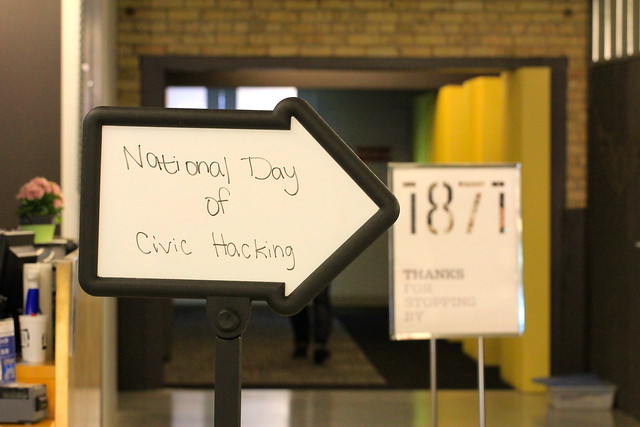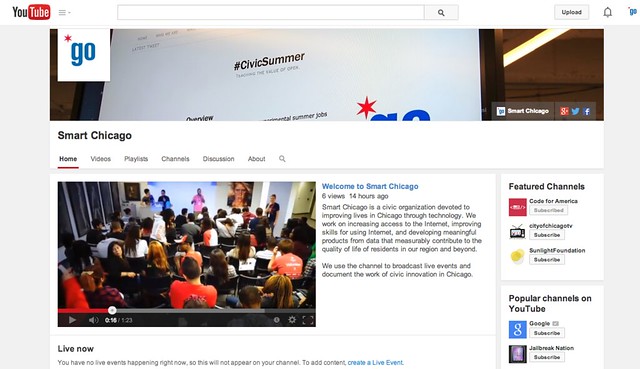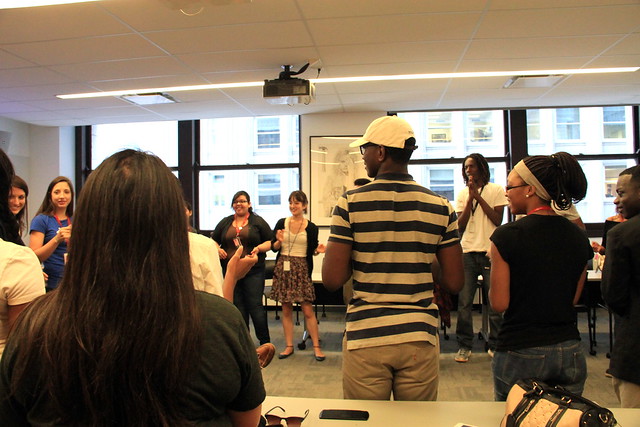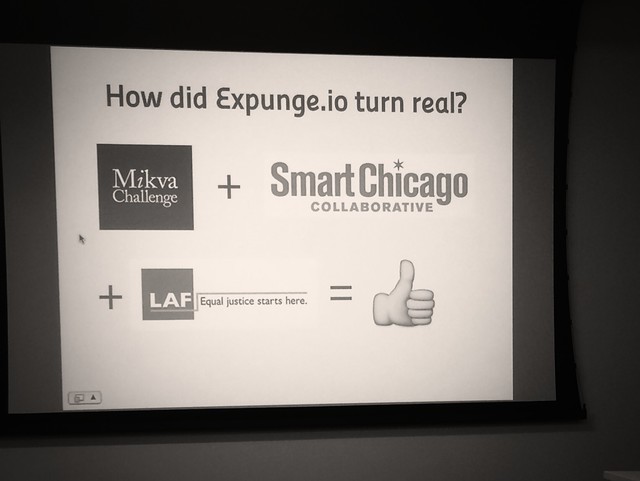As part of the kickoff to National Day of Civic Hacking, Christopher Whitaker spoke at the OpenGov Hack Night on May 27th, 2014 about the progress that’s been made since last year’s event.

Opening the data
Over the past year, there’s been a concentrated effort by the city and the county to open up more of their data and to make the data more usable. Additionally, there have been several successful efforts to get data out of the sole domain of geekdom and into the public at large.
City of Chicago’s Data Dictionary
One of the most underrated stories of the year has been the City of Chicago’s new data dictionary. The Data Dictionary is a single, comprehensive database catalog for the City of Chicago and City of Chicago sister agencies. The data dictionary contains detailed information on every data set held by City agencies and departments, how and if it may be accessed, and in which formats it may be accessed – even for data not released on the portal yet.
The project was the result a year-long effort of the Chicago Department of Innovation and Technology and Chapin Hall with funding provided through a $300,000 grant from the John D. and Catherine T. MacArthur Foundation.
What’s more is that these efforts have been open sourced on the city’s GitHub page so that other cities can take advantage of the work being done.
Part of what makes the Metalicious platform powerful isn’t necessarily the public facing elements. The City is using the tool to manage their own vast disparate sources of data.
How this is important to the future:
Going forward as other cities begin to open up data, the Metalicious platform will be useful to other cities in managing their data.
Cook County Deal with Smart Chicago
While Chicago’s continues to be post data to their data portal at a steady rate, the county has not been able to get as much data up on their portal as they’d like. Last December, the County passed an ordinance stating that the county would work to release parcel data along with other highly sought after data sets. In January, the county entered an agreement with the Smart Chicago Collaborative to split the cost for a consultant to help the county open up more data. A few weeks later, Kalov Strategies came on board to help the county with their data. (And we finally got parcel data out the door fueling sites like Largelots.org)
Here’s how it’s important to the future
More data mean more fuel for civic innovation efforts. Additionally, this will also serve as a model to other communities on how to get needed staffing for open data efforts.
Chicago Architecture Foundation’s City of Big Data Exhibit
Another big event that’s happened recently is the opening of Chicago Architecture Foundation’s City of Big Data Exhibit. This exhibit takes open data sets from a number of different entities, including the Chicago Health Atlas, and lays it out on top of a 3D replica of the City of Chicago.
How this is important to the future:
Exhibits like this will help bring the work we do out into the mainstream. Too often, big data and predictive analytics are portrayed as some kind of magic. The exhibit will help showcase how cities use data and help demystify the field.
Working in the community
Civic Works Project
The Civic Works Project is a two-year effort to create apps and other tools to help increase the utility of local government data to benefit community organizations and the broader public. This project looks systemically at public and private information that can be used to engage residents, solve community problems and increase government accountability.
Since last year, the program has launched a number of apps and projects with our partners including Crime and Punishment in Chicago, the ACA Outreach App, our efforts with Local Data and SWOP, as well as our collaboration with WBEZ’s Public Data Blog.
Englewood Codes
One of the most important activities happening in the city is the push to increase digital skills. The Englewood Codes program, ran by Demond Drummer at Teamwork Englewood, is a great example of neighborhood organizations getting students involved in technology. After last year’s demo day, Teamwork Englewood has continued the program taking the top students from last summer and going much more in-depth with this year’s program.
CivicSummer -> Expunge.io
Maybe one of the best examples of technologists working in tandem with community organizations is the story of Expunge.io. The site grew naturally out of work we did over our CivicSummer, interacting with youth on the Juvenile Justice Committee about what interested them, where their research took them, and what issues mattered most to them. Together, we were able to connect Mikva’s Chris Rudd with civic technologist Cathy Deng and Legal Aid Foundation Chicago to develop an app that helps youth expunge their juvenile records.
The Rise of the Working App
All of this is leading to the rise of the working app, apps that don’t just display data, but assist in the interaction between civic organizations and residents. These working apps require collaborative efforts from technologists, data owners, and civic organizations. The magic behind these apps is not the technology – but the cooperation between the different elements.
One of the best examples of these working apps is the new Largelots.org program. Under the old program, you could only purchase a vacant lot from the city if you owned an adjacent property. The new program was designed with community feedback with Teamwork Englewood and Resident Association of Greater Englewood (R.A.G.E.) spearheading community outreach around the program. Once the new policy was implemented, Drummer reached out to civic technology company Datamade to build a site that could help residents navigate the new program.
Using parcel data just opened up by Cook County, Datamade was able to build a site that help streamline the interaction between residents and government. Through the program’s pilot period, the city received 414 applications during a short time frame from residents wanting to purchase land that’s currently owned by the city. Under the old program, the city only received 34 applications for all of 2013.
A program like largelots.org only works because of the connections made between community organizations, the government, and the technologists. The magic isn’t in the technology, the magic is the connections between the organizations working together towards civic innovation.
During National Day of Civic Hacking, we’ll be focused on hearing from front line community organizations and listening to their needs and challenges. From there, we’ll be brainstorming about creating working apps that can help those organization tackle their challenges.
As we begin another year of civic hacking, we look forward to seeing even more working apps being built and launched.




